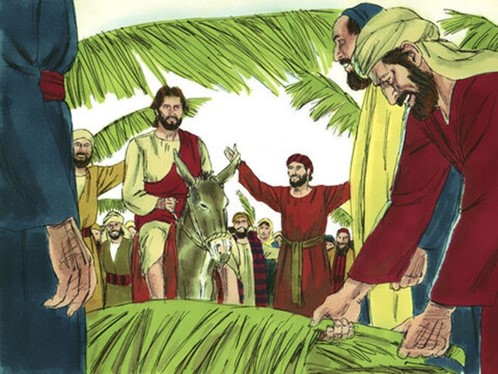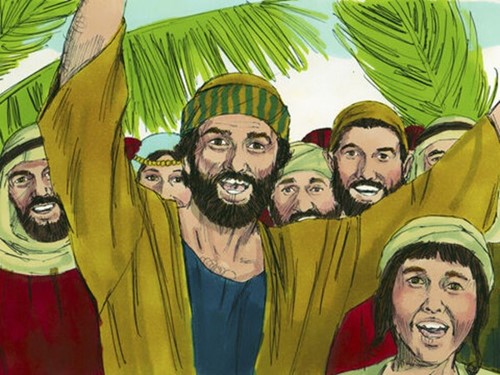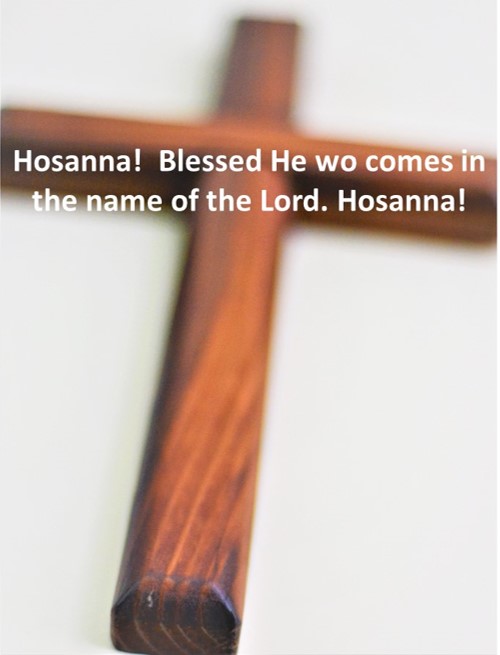Good morning!
Greetings in the name of the Father, the Son, and the Holy Spirit.
The next day the great crowd that had come for the festival heard that Jesus was on his way to Jerusalem. They took palm branches and went out to meet him, shouting,
“Hosanna!”
“Blessed is he who comes in the name of the Lord!”
“Blessed is the king of Israel!”
Jesus found a young donkey and sat on it, as it is written:
“Do not be afraid, Daughter Zion;
see, your king is coming,
seated on a donkey’s colt.”
At first his disciples did not understand all this. Only after Jesus was glorified did they realize that these things had been written about him and that these things had been done to him.
Now the crowd that was with him when he called Lazarus from the tomb and raised him from the dead continued to spread the word. Many people, because they had heard that he had performed this sign, went out to meet him. So the Pharisees said to one another, “See, this is getting us nowhere. Look how the whole world has gone after him!” (John 12:12-19)

The scene in John 12:12-19 captures a moment of intense anticipation and celebration as Jesus enters Jerusalem. The crowd’s excitement is palpable, their actions steeped in messianic hope and nationalistic fervor. They spread palm branches before Him, a traditional symbol of victory and triumph, shouting “Hosanna,” a plea for salvation that had become an exclamation of jubilation. This public display reflects the popular expectation of Jesus as the promised king who would overthrow Roman oppression and restore Israel’s glory.
However, Jesus subverts these expectations with His humble approach, choosing a donkey for His mount, an animal associated with peace rather than a war horse, which would have signaled military intent. This choice fulfills the prophecy of Zechariah 9:9, portraying a king who comes in humility and peace, not in arrogance and war. It’s a powerful contrast that sets the tone for His entry—not as a conquering hero in the usual sense, but as a peaceful ruler initiating a different kind of kingdom.
Rejoice greatly, Daughter Zion!
Shout, Daughter Jerusalem!
See, your king comes to you,
righteous and victorious,
lowly and riding on a donkey,
on a colt, the foal of a donkey. (Zechariah 9:9)
This entry of Jesus into Jerusalem is not just a historical event; it is laden with spiritual significance. It introduces Jesus as a king whose agenda is radically different from the worldly power structures. He comes to establish a kingdom that prioritizes spiritual liberation over political dominance, offering peace that addresses the deepest needs of the human soul. This peace is not merely the absence of conflict but a comprehensive well-being that permeates all aspects of life.
Today, Palm Sunday, we invite you to personally meet Jesus Christ as King while pondering the nature of true kingship and peace—how Jesus’ approach challenges our worldly understandings and expectations, calling all of us to a deeper reflection on the meaning of His kingdom and the peace He offers, which surpasses all understanding.

The Expectation of a King
At the time of Jesus’ triumphal entry into Jerusalem, the city was a nexus of political tension and spiritual anticipation. The Jewish people, under Roman occupation, were deeply yearning for a messianic deliverer who would liberate them from Roman oppression and restore the kingdom of Israel to its former glory. This longing was fueled by prophecies and a rich tradition of kingship in Israel’s history, which led them to expect a messiah who would be a powerful, warrior-like king.
Zechariah 9:9 provides a prophetic picture that aligns with Jesus’ entry: “Rejoice greatly, Daughter Zion! Shout, Daughter Jerusalem! See, your king comes to you, righteous and victorious, lowly and riding on a donkey, on a colt, the foal of a donkey.” This prophecy speaks of a king who comes in humility, not on a warhorse but on a donkey, symbolizing peace and not conquest. Jesus fulfills this prophecy, but in a manner that contrasts starkly with the prevailing expectations of the time. His approach to kingship was not about political power or military might but about establishing a kingdom based on spiritual truths, justice, mercy, and humility.
The crowd’s reaction to Jesus’ entry, as they spread palm branches and shouted “Hosanna,” reflects their desire for a political savior who would immediately overthrow Roman rule. However, Jesus’ kingship was to be far more profound and transformative. His rule was not about temporary political change but about eternal spiritual transformation. John 18:36 underscores this, where Jesus says, “My kingdom is not of this world.” Here, Christ delineates His kingship from earthly political paradigms, emphasizing a kingdom that transcends worldly power structures and is founded on divine principles.
The misunderstood nature of Jesus’ kingship reflects a common human tendency to prioritize earthly power and liberation over spiritual renewal and salvation. Jesus came to establish a kingdom where the last are first (Matthew 20:16), the meek inherit the earth (Matthew 5:5), and peace, righteousness, and justice prevail (Isaiah 9:7). His mission was to bring about a transformation that would not just change the external circumstances but would fundamentally alter the human heart and society in line with God’s will.
In essence, Jesus’ kingship and the expectations surrounding it illuminate the contrast between human desires for temporal power and God’s plan for eternal redemption. His entry into Jerusalem on a donkey, fulfilling Zechariah’s prophecy, symbolizes a kingship characterized by peace, servitude, and spiritual transformation, offering a new paradigm of divine rule that challenges believers to reassess their understanding of power, authority, and salvation.

The Nature of Christ’s Kingship
The Nature of Christ’s Kingship is a profound theme that encapsulates the essence of Jesus’ mission and the revolutionary nature of His rule. The decision to enter Jerusalem on a donkey, rather than a horse, which was a common symbol of war and conquest, underscores the peaceful and servant-oriented nature of His kingdom.
Symbolism of the Donkey
In biblical times, the donkey was a symbol of peace, often used by kings during times of peace, as opposed to horses which were associated with war. Jesus’ choice of a donkey as His mode of transportation into Jerusalem was a deliberate fulfillment of prophecy and a clear declaration of His peaceful intent. Zechariah 9:9 underscores this, prophesying the coming of a king who is “righteous and having salvation, gentle and riding on a donkey.” This act signified that His kingdom would not be established by force or violence but through humility and peace.
Jesus’ Kingship Attributes
Jesus’ kingship is marked by attributes that starkly contrast with earthly kingship models, which often emphasize power, dominance, and wealth. His rule is characterized by justice, mercy, humility, and divine authority. Throughout His ministry, Jesus demonstrated these qualities by serving others, prioritizing the marginalized, and teaching the principles of love and forgiveness. In Matthew 20:28, Jesus Himself states, “the Son of Man did not come to be served, but to serve, and to give his life as a ransom for many,” highlighting the servitude aspect of His kingship.
Kingdom of Heaven
The Kingdom of Heaven that Jesus was inaugurating is fundamentally different from earthly kingdoms. It is not constrained by geographical boundaries or temporal powers but is eternal and rooted in the spiritual realm. This kingdom is characterized by values such as love, joy, peace, and righteousness. In the Sermon on the Mount, Jesus outlines the beatitudes (Matthew 5:3-12), which serve as a manifesto for the Kingdom of Heaven, emphasizing the blessings on those who embody its values.
3 “Blessed are the poor in spirit,
for theirs is the kingdom of heaven.
4 Blessed are those who mourn,
for they will be comforted.
5 Blessed are the meek,
for they will inherit the earth.
6 Blessed are those who hunger and thirst for righteousness,
for they will be filled.
7 Blessed are the merciful,
for they will be shown mercy.
8 Blessed are the pure in heart,
for they will see God.
9 Blessed are the peacemakers,
for they will be called children of God.
10 Blessed are those who are persecuted because of righteousness,
for theirs is the kingdom of heaven. (Matthew 5:3-12)
The Kingdom of Heaven is not established through coercion or political maneuvering but through the transformation of hearts and minds, aligning with God’s will. John 18:36 further illuminates this distinction when Jesus declares, “My kingdom is not of this world.” This statement not only reaffirms the spiritual nature of His reign but also His ultimate authority over all earthly and heavenly realms.
In summary, the nature of Christ’s kingship, symbolized by His triumphant yet humble entry into Jerusalem on a donkey, introduces a new paradigm of leadership and authority. His kingship, marked by peace, servitude, and spiritual governance, invites believers to re-evaluate their understanding of power and leadership. It calls for a commitment to the values of the Kingdom of Heaven, where righteousness, peace, and joy in the Holy Spirit prevail (Romans 14:17), guiding followers to live in a manner that reflects the transformative and eternal reign of Christ.
For the kingdom of God is not a matter of eating and drinking, but of righteousness, peace and joy in the Holy Spirit, (Romans 14;17)

The Peace that Christ Brings
The peace that Christ brings transcends the common understanding of peace as merely the absence of conflict. Biblically, peace, or “shalom,” signifies a profound sense of well-being, completeness, and harmony that permeates every aspect of our lives. It encompasses physical, emotional, spiritual, and social dimensions, pointing to an ideal state of existence where everything is in perfect order and alignment with God’s will.
Definition of Peace
In the Bible, peace is a multifaceted concept. It is not just a state of tranquility but a condition of wholeness and prosperity in every area of life. This is evident in the Old Testament use of the word “shalom,” which implies much more than mere peace of mind or ceasefire between enemies. For instance, in Numbers 6:24-26, the Aaronic blessing seeks divine peace upon Israel, invoking God’s favor to bring about a life of completeness and wholeness.
“‘“The Lord bless you
and keep you;
the Lord make his face shine on you
and be gracious to you;
the Lord turn his face toward you
and give you peace.”’ (Number 6:24-26)
Spiritual Reconciliation
Central to Jesus’ mission was the establishment of peace between God and humanity, a fundamental aspect of Christian doctrine. Through His life, teachings, death, and resurrection, Jesus bridged the vast chasm of sin that separated humans from God, thus restoring the relationship intended from creation. This reconciliation is vividly portrayed in Romans 5:1, “Therefore, since we have been justified through faith, we have peace with God through our Lord Jesus Christ.” Through His sacrificial love, Jesus absorbed the wrath deserved by humanity, granting access to a peaceful relationship with God.
Enduring Legacy
The peace that Jesus brings has a lasting impact that extends far beyond individual spiritual experiences. It permeates the fabric of personal lives, influences communities, and resonates throughout the global landscape. In John 14:27, Jesus differentiates the peace He gives from worldly peace: “Peace I leave with you; my peace I give you. I do not give to you as the world gives.” His peace is not contingent on circumstances but is a profound, enduring reality that sustains believers through life’s tumultuous journeys.
This divine peace transforms personal lives, instilling a sense of security and purpose that aligns with God’s will. It fosters communities where justice, mercy, and love prevail, reflecting the kingdom of God on earth. Collectively, this peace has the potential to influence global dynamics, advocating for justice, and promoting reconciliation and understanding among diverse peoples.
In conclusion, the peace that Christ brings is a comprehensive reality that offers reconciliation with God, transformation of the individual, and the potential for a more harmonious world. It calls believers to live out this peace in their daily lives, serving as ambassadors of Christ’s reconciliation (2 Corinthians 5:20) and agents of His peace in a fractured world. This mission, rooted in the peace of Christ, challenges and empowers Christians to reflect the peace of the Kingdom of Heaven in every sphere of life.
We are therefore Christ’s ambassadors, as though God were making his appeal through us. We implore you on Christ’s behalf: Be reconciled to God. (2 Corinthians 5:20)
Summary
Jesus’ triumphant entry into Jerusalem marks more than a momentous event in biblical history; it signifies the commencement of a kingdom grounded in peace, transcending human understanding and expectation. This peace, heralded by Jesus’ humble entry on a donkey, is not merely the absence of turmoil but represents a profound restoration of divine order, where relationships, systems, and creation are realigned under God’s sovereign reign.
Today, on Palm Sunday, let’s all together introspectively examine our perception of Jesus as King and the transformative peace He offers. It is crucial to recognize that the peace Jesus brings challenges and reshapes conventional notions of power, authority, and salvation. This divine peace calls for active participation in its unfolding, urging all of us to embody its principles in every facet of our lives.
Therefore, we all should be encouraged to embody this peace, demonstrating it through acts of love, reconciliation, and justice within their communities and beyond. By living out the peace of Christ, believers actively participate in the ongoing realization of His kingdom on earth, contributing to a world that reflects the harmony and wholeness of God’s original design.
Continue reflecting on Jesus’ kingship and the peace He inaugurates prompts a deeper commitment to living in a manner that fosters unity, celebrates diversity, and advocates for justice. It challenges individuals to become agents of peace in a world marred by division and strife, embodying the hope and restoration that Jesus’ kingship embodies.
Finally, what is the essence of Jesus’ entry into Jerusalem? His peace should inspire us to re-evaluate our roles as followers of Christ. We are called to be peacemakers, justice-seekers, and kingdom-builders, reflecting the character and priorities of Jesus in every action and relationship. This reflection and action signify a dynamic faith that not only anticipates the full realization of God’s kingdom but actively participates in its manifestation here, now, and forever till His second coming.
Let us bow down to God and give thanks for sending Jesus Christ as our King today. Let us open our hearts to receive Him as our true and only Savior, while committing ourselves to reflect His character in our daily lives. In His precious name, Jesus Christ, Amen.

And the peace of God, which transcends all understanding, will guard your hearts and your minds in Christ Jesus. (Philippians 4:7)
